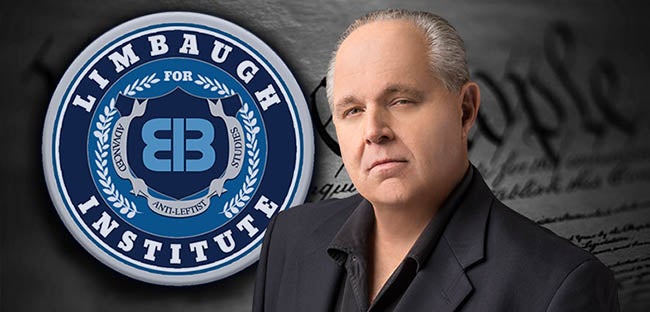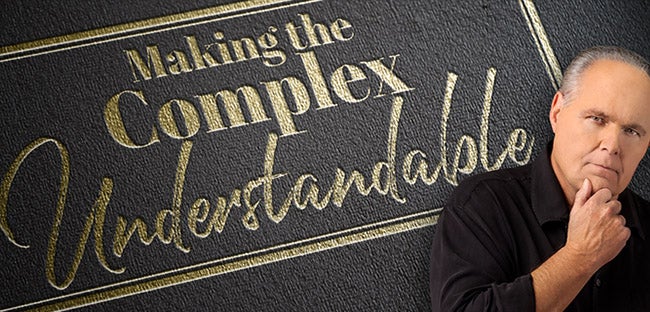RUSH: Now, “pass-through.” There are terms that become accepted in usage among people in specific businesses, and only they really know what it means, and these terms serve to confuse other people. In many businesses, that’s a desire to keep people not in the business confused about what is being said, what things really mean. In this case, “pass-through” is simply a term to describe an entity where income passes through and ends up in the recipient in a different form. So let’s say… By the way, this is not possible if you are a salaried or hourly or wage employee.
 You cannot do this. This is strictly for small businesses, medium-size businesses. But if you earn a wage from which taxes and other charges are withheld, then you don’t qualify. Now, there’s exceptions to everything. Let’s say that you work as a middle manager at a bank, and you’re really valuable to this bank. You could go to them and say, “You know what? I want you to hire me as a consultant, and I want you to pay me exactly what you pay me now but you pay me the gross and I’m gonna set myself up as Big Business Banker, LLC.”
You cannot do this. This is strictly for small businesses, medium-size businesses. But if you earn a wage from which taxes and other charges are withheld, then you don’t qualify. Now, there’s exceptions to everything. Let’s say that you work as a middle manager at a bank, and you’re really valuable to this bank. You could go to them and say, “You know what? I want you to hire me as a consultant, and I want you to pay me exactly what you pay me now but you pay me the gross and I’m gonna set myself up as Big Business Banker, LLC.”
If you could convince your employer to hire you that way, then what I’m going to suggest here you could do. This is essentially the way a small business is organized under the rules called subchapter S. I don’t know what “subchapter” means; I don’t know what “S” means. Don’t worry about it. It’s just what it’s called. It’s like blue is a color. You don’t question it. It’s just what it is. The best illustration of this, by the way, is John Edwards. The best illustration of the hypocrisy of this is John Edwards.
It all became clear when Congress passed a new Medicare tax, separate from the Social Security payroll tax. The Medicare tax is… I’m not sure what the number is now, but we’ll go with 3.5% or 3.9% on everything you earn. Unlike Social Security, it doesn’t end once you hit a certain salary ceiling — or floor, as it is. So you organize as a subchapter S, and you are the ABC Widget Company, and your business generates… I’m gonna use elevated numbers here for the sake of ease of explanation. Let’s say that your business earns a $1 million a year. That’s how much people pay you.
You have different people paying you for your service, and each of them pay a different amount. It’s what you charge them versus how much work you do for ’em. That gross of $1 million dollars — if you were not sub-S, if you’re just an individual, independent contractor — you’d report all of that as income, and you’d pay taxes on all of that as income minus the standard deduction, minus whatever else you get. Plus the Medicare in toto you would pay. If you organize as a sub-S, you take that $1 million and you decide to pay yourself $100,000.
That means $900,000 stays in your business. It doesn’t mean you can’t touch it. It’s just not income to you taxed at personal income tax rates. So you assign yourself a $100,000-a-year income, and you pay yourself, and you deduct your federal taxes. You deduct your Social Security and your Medicare from that $100,000, not your $1 million. You can pay yourself $500,000 if you want. You can pay yourself $250,000. You pay yourself whatever you want. But the purpose here is to be able to have as little exposure to income tax as possible.
 So you earn $1 million gross; you pay yourself $100,000. You pay yourself twice a month like everybody else, and the sum total of your checks that you pay yourself equals the $100,000 minus the deductions. That’s the pass-through. The sub-S becomes the pass-through, and in that way, $900,000 of the $1 million you earn is not taxed at personal income tax rates. It’s taxed at business rates — or, in this case, the pass-through rate of 25%. Otherwise, this example would be paying 39.6%.
So you earn $1 million gross; you pay yourself $100,000. You pay yourself twice a month like everybody else, and the sum total of your checks that you pay yourself equals the $100,000 minus the deductions. That’s the pass-through. The sub-S becomes the pass-through, and in that way, $900,000 of the $1 million you earn is not taxed at personal income tax rates. It’s taxed at business rates — or, in this case, the pass-through rate of 25%. Otherwise, this example would be paying 39.6%.
Now, you can do all kinds of things with this. So your business is grossing $1 million a year, but you’re only paying Medicare tax on $100,000 of it, and you’re only paying income tax on $100,000 of it. So what happens to the other $900,000? That’s up to you. You can use some of it to bonus yourself at the end of the year and make that business and job performance related, and it might have a different tax rate. You keep that money plowed into the business so that you’re investing into other aspects of the business so that it’s growing.
So that the $1 million you’re earning becomes $1.5 million the next year or what have you. Now, I found the best way to illustrate this is John Edwards, the former Democrat presidential candidate and big, bleeding-heart liberal. His most recent presidential campaign theme was “two Americas.” (impression) “There’s the poor America and the wealthy America,” and he would run around and talk to people. “Why are you poor? What does it feel like? How are you getting’ by?” He would go on and on about how America was unfair and unjust and this and that and everything.
And then it was learned (because he ran for office, filed his tax return, and made ’em public), he had a net worth of something like $35 million or $50 million, and he was paying a Medicare tax that was minuscule. Finally people looked into it, and they found out that he was paying himself an income every year of like $60,000, and therefore paying income tax rates only on $60,000 instead of everything he earned because he’d set himself up as a Subchapter S corporation. There was nothing illegal about it. There’s nothing illegal about anything I’m telling you. Not a thing.
All of this is perfectly legal. Now, there are limits, restrictions. (sigh) It’s not a license to steal, but in the example I gave, you can earn $1 million gross in your small business and pay yourself a salary of $100,000 and report income only on that $100,000. Now, the odds are that if your small business is grossing $1 million dollars it’s costing you a lot to produce that so you’ve got a lot of expenses. You may have employees you have to pay in addition to yourself. So that $900,000 that is not being paid to you, is being spent on business expenses and employees and their health care.
 I don’t mean to describe this as it’s a way to make out like a bandit. But when John Edwards did it and when people found out, they were floored. They were shocked. “John Edwards was cutting corners and not paying the full Medicare tax? Why, that’s for people who can’t afford health care, and he’s a big Democrat liberal concerned about sick people. He was trying to avoid it?” Damn right he was, like everybody tries to avoid taxes. It’s the smart thing to do! Tax avoidance is not tax cheating. Tax avoidance is not illegal.
I don’t mean to describe this as it’s a way to make out like a bandit. But when John Edwards did it and when people found out, they were floored. They were shocked. “John Edwards was cutting corners and not paying the full Medicare tax? Why, that’s for people who can’t afford health care, and he’s a big Democrat liberal concerned about sick people. He was trying to avoid it?” Damn right he was, like everybody tries to avoid taxes. It’s the smart thing to do! Tax avoidance is not tax cheating. Tax avoidance is not illegal.
Tax avoidance is simply taking advantage of rules and laws. And the pass-through law, they’re trying to encourage more of this by lowering the small business tax rate down to 25%. If you could pay 25% on your income instead of 39.6%, wouldn’t you do it? If you find a legal way to do it? Now, if you’re a salaried employee, if you’re a wage earner, you can’t do any of this, you’re not an equity, you’re not a small business owner.
But people who are entrepreneurs, who invest to start their own businesses, take that risk, these kinds of things are open. There’s LLCs, there’s subchapter S, there’s C-Corps, any number of things, but the sub-S is basically the pass through-here. And the reason why it’s big is because what the sub-S rules allow is for small business owners to file their business taxes on their personal income tax return. And that’s why the sub-S is an attractive option for small businesspeople. You don’t need two books, you don’t need two separate tax returns, one for your personal income, the other for business. You can combine them. It makes it all much easier.
Now, it’s much more work too. Once you have to start paying yourself, you’ve gotta figure out what to deduct and you’ll have to hire an accountant to pay yourself. You’ll have to hire somebody to run the books here. I don’t want to paint a picture of it’s easy to steal money. But that’s what the pass-through is, and that’s how it operates, and that’s how people can limit their exposure to high income tax rates by claiming much less of their earnings as earned income instead of business income.
All of it’s legal. And there are a lot of people that do it. There are a lot of American small business owners that file their business returns on their personal income tax form. And that’s why Ryan and his gang are making such a big deal out of reducing the pass-through rate, which is basically the sub-S rate down to 25%. It’s a much, much smaller rate than the 35 or 39.6 would be. So I hope that helps explain it. A lot of people do this just to avoid paying the full boat on Medicare.
 If you earn a million dollars a year — again, just to use this number — and you do not avail yourself of the opportunity to organize, you’ll pay 3.4% of that million-dollar gross on Medicare. You’ll have a ceiling that you reach on Social Security, where after you — I don’t know what it is now — you earn 200 grand a year, you stop making Social Security deductions. But Medicare is on every dollar you earn. And 3.4% of a million, that’s a lot of money that you can avoid paying if you organize sub-S. And that’s one of the reasons people do it. And the people that wrote the tax code knew this was gonna happen. Nothing illegal about any of this. And there’s nothing illegal about trying to avoid paying as much tax as you can.
If you earn a million dollars a year — again, just to use this number — and you do not avail yourself of the opportunity to organize, you’ll pay 3.4% of that million-dollar gross on Medicare. You’ll have a ceiling that you reach on Social Security, where after you — I don’t know what it is now — you earn 200 grand a year, you stop making Social Security deductions. But Medicare is on every dollar you earn. And 3.4% of a million, that’s a lot of money that you can avoid paying if you organize sub-S. And that’s one of the reasons people do it. And the people that wrote the tax code knew this was gonna happen. Nothing illegal about any of this. And there’s nothing illegal about trying to avoid paying as much tax as you can.
Now, liberal Democrats will try to criminalize it and they’ll try to say it’s a moral failure. That you ought to be paying more than your fair share if you’re the rich because you’re not paying enough. Of course, this is all bunk. But that’s, again, why such a big deal is made on the improvements they’re making to the pass-through rate.
BREAK TRANSCRIPT
RUSH: That’s right. Pass-through income is business income claimed on individual tax returns. Instead of facing the corporate income tax, it passes through the business to the business owners tax at their individual tax rates. That’s the best summation of the pass-through I can give you.


